

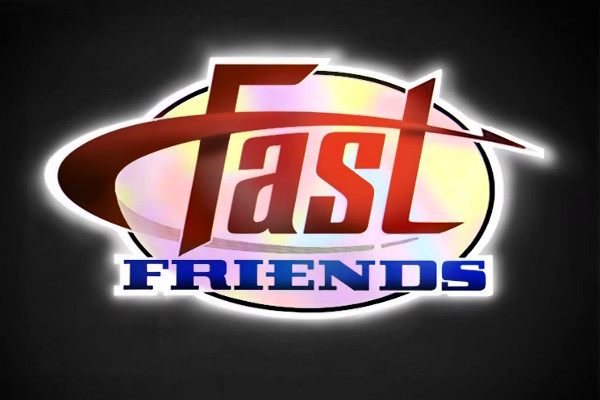
Airing from March to June 1991, the series was shifted in the schedules as it failed to find an audience. Les regretted ever taking part, and slated it in his second autobiography. But was it really as bad as all that? Please join me as I investigate and rank the series...
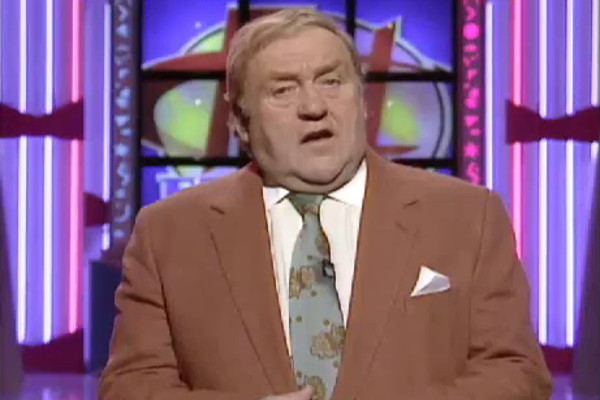
As articles on Blankety Blank were, surprisingly, the most popular things published on this cult TV site, I decided to take a "what Les did next" look at the quiz show that followed, Fast Friends. Recording on Blankety Blank had largely wrapped up in July 1989, barring a Christmas Special, after which Les went on to an unspectacular run hosting an ailing Opportunity Knocks revival in 1990.
Fast Friends was recorded from March-April 1991, with Les having turned sixty, and was launched as a Saturday night primetime show. This was the highest-charting - albeit not quite the highest-rated - episode of the whole series, reaching 35th place with 7.6 million viewers. It was also the last one to go out as a Saturday primetime show, with the BBC rearranging their schedules after the series had performed badly in the slot. Overall the first seven episodes had averaged 7.06 million and 44th place in the charts.
For the first month it averaged 6.85 million and 49th place in the charts against ITV's You Bet! with Matthew Kelly, which was doing business of 11.93m and 12th place as an average. After You Bet! finished, ITV threw repeats of Duty Free and Perfect Scoundrels in its place, which should have given time for Les to find an audience. Which it did, after a fashion - episodes 5-7 of Fast Friends averaged at 7.33 million and 36th place in the charts. Yet ITV's competition of repeats, some of them 7 years old, averaged out at 8.13m/28th place for the same period. When you're getting beaten in the ratings by repeats, it's clear that the writing, as they say, is on the wall.
This edition ranks last as it's very stitled and lifeless, with contestants giving little reaction to Les's quips. Though it doesn't really help that Les starts things off with golf gags, very much a niche, middle-class sport that few would participate in. (The BBC still believed it was enough of a mainstream draw to give Jimmy Tarbuck a golf-based quiz show five years later, but that's another story...)
There are some odd gags that would be unlikely to play today, including a man who tells Les he's "married with two small children", only for Les to fire back: "I thought you'd have had a grown woman". There's a reason why joking that contestants are nonces never became a staple of quiz shows, and after this Les pretty much gives up the gags to just ask what the rest of the groups do for a living.
Although airing seventh, this was just the fourth to be recorded. As two of those four were pilot episodes, it means that this is just the second broadcast episode Les did, and he does seem continually behind with the rules. Not only that, but the quality of the questions is a bit simpler than other editions, with a lot more overt "joke" answers to make it easier.
Les's lack of enthusiasm for the format is pretty obvious throughout this edition, something reflected in his second autobiography, 1992's No Tears For The Clown: "Tracy and I began our weekly flights to London, and then on to Elstree to record what will probably be known in years to come as the greatest load of crap ever to be committed to film as far as I was concerned." Les wrote at some length about the series in the book, and we'll dip in and out throughout this article to build up a clearer picture of the show.
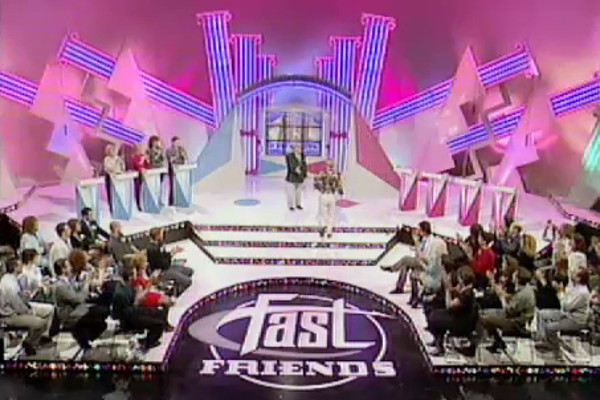
So, how does Fast Friends work? Well, there's three stages of the game, and, while it can seem complicated (Les: "I couldn't get the hang of the wretched game, and tempers began to fray.") it's really quite straightforward when you go through it.
The first round sees two individuals, or "Team Captains", take turns trying to compile a group of titular "fast friends". With four questions to answer and just thirty seconds to do it in, the "Captains" have to decide how long to spend on each question, then frantically run around 32 possible team members trying to find people who can answer the questions in the allotted timescale. Get all four right, and you've got a full complement, and whoever has the most team members at the end of the second round goes on to the final, so it's a bad start if you don't get all four questions right.
Said second round drops the "rapid" element of the game, and instead sees Les chat with the contestants before they answer questions that have three possible answers. This is perhaps one of the flaws with a not-terrible format, in that there's no "through line", nothing to really connect the games. The most popular quizzes are usually simple in their set up, even if not in their answers: Mastermind, someone sits in a black chair and answers questions; Family Fortunes, five family members answer questions based on the views of the public, and so on.
There might be extra bits and different arrangements for the final games, but there's basically a core idea that runs throughout the whole thing, so that even the most intelligence-deficient viewer can pick up what's going on. Fast Friends doesn't have that, instead essentially going for a "three games in one" format, with the entire point of the title discarded less than halfway into the show. For when it comes to the second round and the final, Les will let all concerned take as long as they want, with just quips about "Meanwhile, back at the ranch..." if they take a while. There's seemingly little point in accruing "fast" friends if they can become snails once you've got them.
Part of the reason for this was explained by Bob Goen, the host of the original US pilot (of which more in a minute). Bob recounted on YouTube that the graphics for the pilot were "kinda cheesy", simply because they'd been slapped together in a hurry as the show was being recorded with no name. Two days before the pilot was shot, a secretary at CBS came up with the name off the top of her head, and they went with it because they had nothing else in mind.
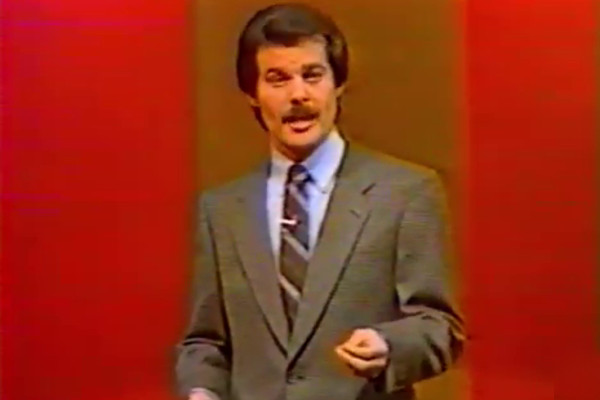
Not technically part of the run, this US pilot is included here purely for completeness' sake. Hosted by Bob Goen, it wasn't optioned as a series and never broadcast, but the format was eventually bought by the BBC years later.
The show is often derided as being "American" in the negative sense of the term, and while it's true the US version features a lot more screaming and jumping up and down than its UK counterpart, such things aren't an essential part of the show. One feature of the pilot that's better than the UK one is the selection process. Whereas on the BBC both team leaders only have one of two sections of potential teammates to choose from, this pilot has them able to go to any potential contestant available. Imagine the competitive edge this would have provided the UK version, with the "talent pool" of potential teammates stripped by the first player... a situation that might have let Les get a joke or two in, as well.
Once the teams have been chosen, the studio is cleared with just the players, all the long couches gone - as opposed to the UK, where the potential players that didn't get picked have to stay sitting in a cheap BBC chair. Naturally, the prizes are also different - whereas the BBC offered £300 and a holiday of a suspiciously undeclared duration as the star prize, this pilot was offering (or claiming to offer) $10,000. As this was 1984, then by 1991/UK terms this would come to around £10,000.
Those looking for stereotypes about Americans to be shattered will be disappointed by watching a series of shockingly easy questions. The questions on the UK version aren't exactly University Challenge, but offer some difficulty, as we'll get to shortly. The inclusion of "comedy" answers also grates incredibly quickly... while this element appears in 1991, it's more subtle.
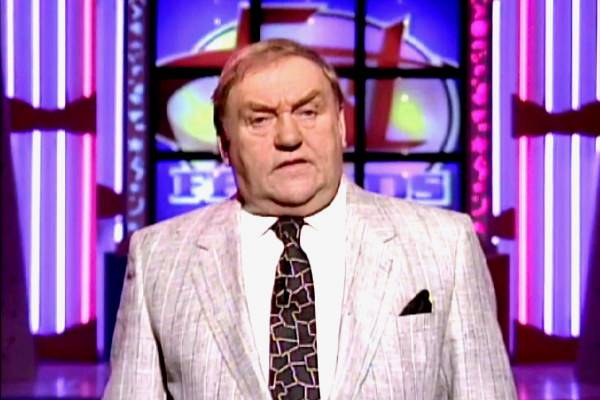
For whatever reason, the show never really got off the ground, debuting with 7.8 million viewers and falling from there. This final episode was partially shown opposite Coronation Street on ITV, a death sentence for any show at the time, and Fast Friends went out with its lowest audience. Just 3.5 million tuned in, seeing it plummet to 93rd place in the charts, 18 places lower than any other chart position for the series.
The BBC gave the show a chance, with the first seven episodes airing in Saturday prime time (usually starting around 7-7:30pm), where the show was obliterated by ITV. The disaster of the show led to Les to rueing the effect the show had on his career: "Not only did my fan mail dry up after the screening of Fast Friends but the telephone practically stopped ringing and I began to understand the isolation felt by Robinson Crusoe. I had had no offers for a summer season - nobody seemed to want me. Up to a point I wasn’t too bothered; Tracy and I needed to do a lot to the house and we welcomed the chance to catch up on some social life, but the thought of being rejected by the business did hurt, I must say".
Confessing he never wanted to do it in the first place, some of Les's comments included: "Its whole premise rested on the antics of crackpot contestants almost wetting themselves in their excitement, and our American cousins seem to excel at producing this type of inanity".
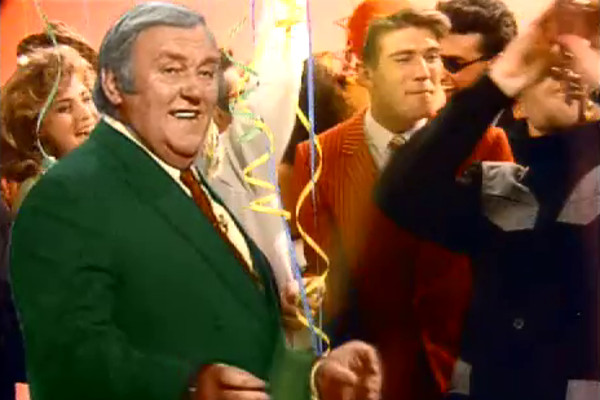
Now, at this point, it's time for a reluctant admission. While Les had many things to say about the show, none of it positive - "I've dropped some big ones in my time, but agreeing to do that show was akin to heaving an elephant's testicles down a pit shaft" - it perhaps has to be acknowledged that while the show was a bad fit for Les, he was also a bad fit for the show.
Produced by his old Blankety Blank producer Stanley Appel, Stan took some of the energy from his other production, Top of the Pops, and created a title sequence that was "hip" and "youthful"... well, hip and youthful as the BBC saw it in the 1990s, anyway. Pastel suit jackets with shoulder pads, party streamers, a girl riding a motorbike that doesn't go anywhere, and a couple of guys playing trumpets.
In amongst this, Les appears for just a couple of frames, where, as seen on the screenshot, he looks crudely grafted in with cheap greenscreen, as if the sequence was shot without him. Which it probably was. In fact, so low in quality is this sequence that plans to use it as the main image for this first page were abandoned as it looked extremely "low res" when blown up in size. (Yes, even more low-res than the two images I went with... you can be so cruel. Also note that Les having silver hair in the title sequence makes it even more obvious that he apparently used a bit of dye for the show proper.)
So you've got a "youth" title sequence for a Saturday night, complete with a jaunty theme tune by the same guy who would go on to compose the new Top of the Pops theme later the same year (Tony Gibber). And in the middle of this hyped-up, youth-orientated attempt at a "party" show, you hire as the host... a 60-year-old variety comedian who specialises in laboured, elaborate jokes with a hang dog expression.
It's a jarring clash of styles, wherein the last party balloon has disappeared and an audience made up of people young enough to be his grandchildren listen to Les tell one of his mother-in-law jokes. While Les as a host for Blankety Blank worked, and worked extremely well, because he derided the show, here it's largely "straight" quiz hosting, which doesn't do him any favours.
Les was a great comedian, but more of a reciting act rather than an ad-lib merchant. With contestants on Blankety Blank he'd clearly have pre-knowledge of their background and have some pre-prepared gags ready. But the very nature of Fast Friends means that eight strangers could be brought up to the stage, with Les only having pre-knowledge of the Team Captains.
One of the most awkward moments of the show is seeing Les going down a two rows of strangers and trying to work out ways to convert their jobs/names/hobbies into a story about the last time he went to the doctor's, almost like they're having a conversation with their gran. Here, with a lot of computer-based occupations, he almost gives up entirely, muttering "exciting" before wandering onto the next person in the row.
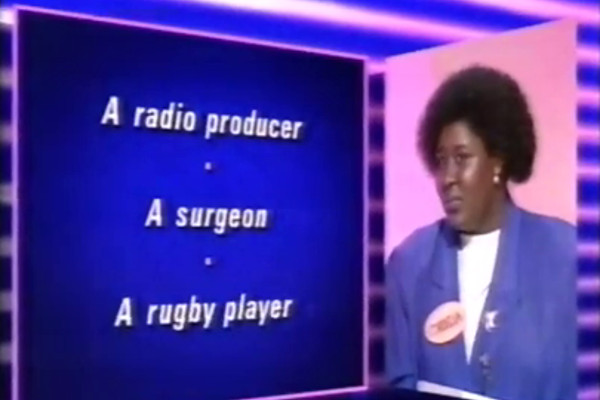
Okay, full disclosure time. While I was fortunate enough to get hold of 13 episodes of Fast Friends, plus a pilot, I was only able to get around half of this second episode. As a result what seems a fairly upbeat, decent episode of the show can't be properly ranked.
I suspect it'd be a bit higher if I had access to all of it, but then the show is very "samey" anyway, you're not going to see much difference from week to week. Rather than let this derail this article, I'll put my hands up to it and we can move on. (I did, incidentally, get to see just short of 15 minutes, so it's not like the episode was completely alien to me.)
This edition was the seventh to be shot on Monday 25th March 1991, and was 41st in the charts with 7.8 million viewers. One last bit of padding this entry out information is that wrong answers on the show are met with a "raspberry" sound effect. Yes, Fast Friends is relatively sophisticated, up to a point, but that's also the level it can drop down to.
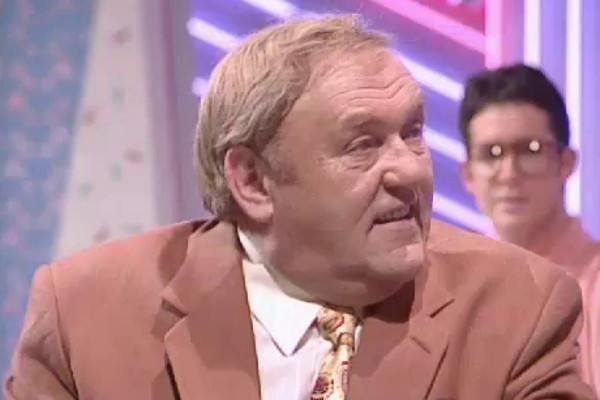
The really saddening part of Fast Friends is that if you didn't know Les Dawson outside of it, you'd perhaps have no idea he was a genuinely funny guy. It's not just that the format doesn't allow him to make full use of his humour, it's also that he was notorious for never updating his act, by his own admission. Even in his Blankety Blank days he was doing gags that were over a decade old, but they got by through charm and delivery.
Much was said about the humour of Blankety Blank being made within a different social climate, and 1991 was still a different age to today, but times had moved on. So it is that Les opening this edition with a joke about a Chinese viewer saying he'd never seen such a load of "clap" gets only a few laughs from the more modern audience. (He was Chinese, so his Rs weren't pronounced, you see? The kind of gag that would have been de rigueur in the 1970s and early '80s, but feels positively painful in the early '90s. A contestant, Linda Longley, gets another "Chinese" gag, as Les repeats the name saying it sounds like an order in a restaurant.)
Because Les is so constrained by the rules of the game - each part has to be completed, this isn't a show that can fall into chaos like Blankety Blank - he'll often slip jokes in as muttered asides rather than "sell" them. A routine about a shepherd having a song "It had to be ewe" gets virtually no reaction whatsoever, while Les commenting on the lack of laughter gets what sounds like a canned audience response to paper over the cracks. His medley of what are today known as "dad jokes" are also not the greatest part of his comic arsenal, but are leaned on heavily for this show. It's like hiring an opera singer and trying to get her to perform scat singing.
Could other comic presenters have done a better job? One question in this edition actually names three, with a question having possible answers of Bob Monkhouse, Bruce Forsyth and Nicholas Parsons. While it may also have been a bit too "frantic" for Nicholas, Bruce's energy-driven style would have been a better fit. Although the charm of "Brucie" was never really understood here at The Anorak Zone, it was something that translated to millions of viewers, and, while he was three years older than Les, his "showbiz" persona leant itself more to the show that Fast Friends is.
Lastly, there's Bob Monkhouse. A film buff and reportedly a nice guy off air who hated his own "smug" TV persona, he somehow got a reputation of being a legendary comedian, despite the fact that most of his jokes could be seen coming a mile away. Yet despite all this, Bob was a solid quiz show host, a real pro. Could he have made Fast Friends work? Maybe, maybe not. After all, Bob had just seen Opportunity Knocks fail in front of him (taken over by Les as very much a "busted flush") so possibly he wasn't in favour during this period. He certainly wasn't in favour with the BBC, as he'd left Bob's Full House and gone to ITV to host The $64,000 Question and Bob's Your Uncle. (By coincidence, Louis Barfe, the author of The Trials and Triumphs of Les Dawson, also speculated on Bruce or Bob hosting the show, giving them the wonderfully accurate description of "game show technicians".)
Other comedians could have perhaps fitted the bill, TV stations aside. Michael Barrymore, for example, who in 1991 was still in his pomp, had the manic energy to keep up the pace of a show like this. This is not to suggest that any of these alternatives are better than Les as comedians, or even anywhere in the same league, but as quiz show hosts for a show with the word "fast" in the title, they'd be more of a natural fit. One important thing to always bear in mind is that when Les first began an additional career hosting quizzes, it was very much as an anti-quiz show host, deriding and deconstructing. Somewhere along the line he became a "proper" quiz show host, and, whatever his skills with comedy, it never quite worked.
Lastly, for Blank trivia, then Fred Housego is the subject of one of the questions in this edition, in relation to his winning Mastermind - though Les makes no reference to having worked with him as a panellist in series eight.
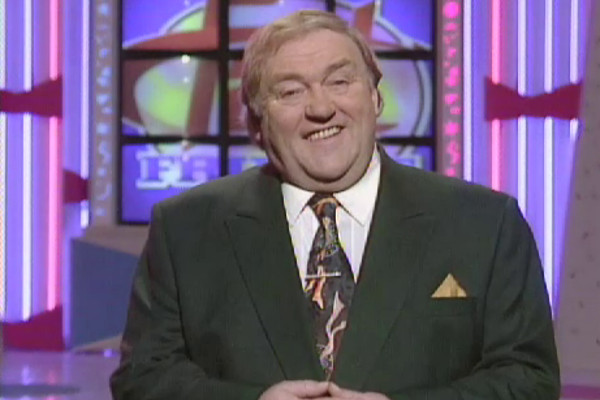
This so-so first episode was actually the fifth to be recorded. Shot on Friday 22nd March 1991, it was broadcast just eight days after it had been shot. It must have gone down okay, as the 7.8 million that tuned in did so again the following week, before the ratings really began to drift downwards. And although 7.8 million sounds pretty good in 2024, at the time it was only enough to place 37th in the charts. (And 41st the following week.) Such things suggest that Fast Friends wasn't exactly unpopular, but that it hadn't been given much of a chance in the first place.
The episode introduces a format that's new to the show, and wasn't part of the US pilot: the inclusion of a "lifeline", where Team Captains get to rescue one exiled team member if they can answer a question correctly on their behalf. While it's not a bad idea as such, with the Captains only able to use the "lifeline" once, it adds extra complication to an already overloaded game. If anything, the show's rules needed streamlining, not adding to.
The very slight intrigue that the "lifeline" allows is that the Team Captain can decide not to save a team member if they think they're not likely to be much good, and save it if needed for a better player. This happens here, where female Team Captain (the Captains are always female/male) Louise Thorley decides to send an elderly contestant into the "Dump Dock" and save it for later. (Louise eventually uses it, getting the answer correct and saving a team member, while opposing Team Captain Nicholas Theobold uses his the first time it's needed and is also successful in its use.)
Such things don't really add much to an overloaded gameplay, whereas a discarded element from the US show - winning contestants get to play again the next week - was dropped, and may have added a bit more intrigue to the series. One real issue with Fast Friends is that it's very "disposable", but having some continuity between episodes, Countdown style, may have added, if nothing else, the sense that you couldn't skip a week.